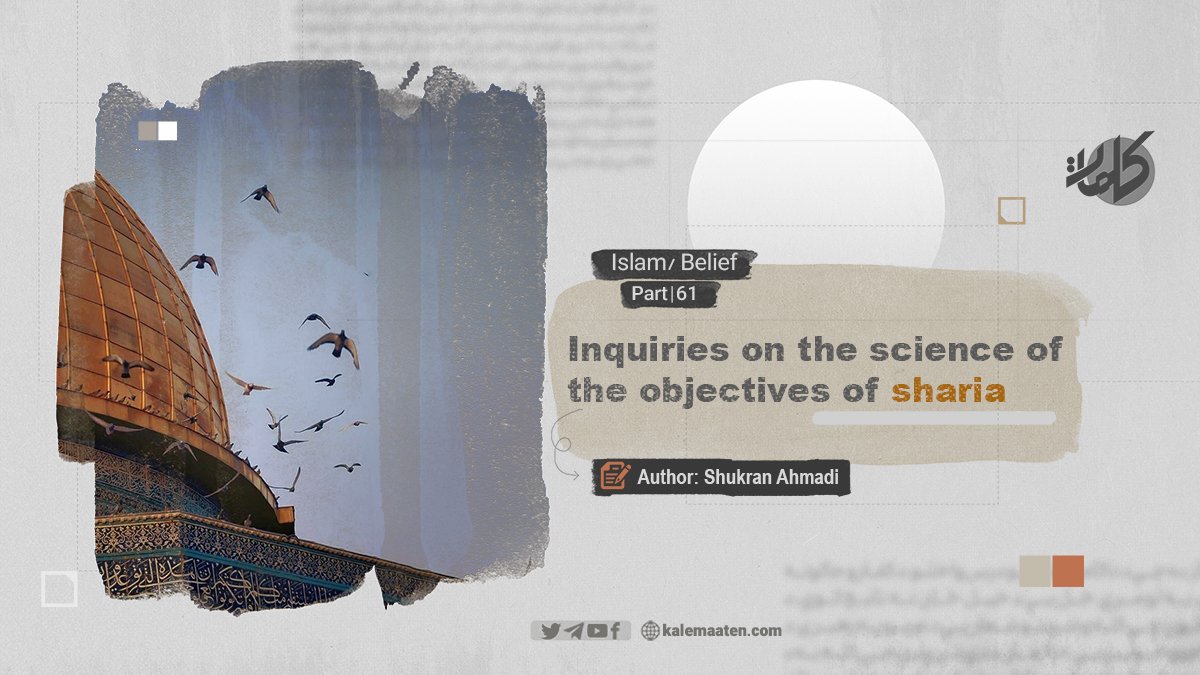Author: Shukran Ahmadi
Inquiries on the Science of the Objectives of Sharia (Part 61)
Consideration of Human Nature and Human Needs
One of the fixed principles upon which the Objectives of sharia (higher objectives of Islamic law) are founded is the consideration of human nature (Fitrah). This is the Fitrah upon which Allah the Exalted created mankind. As the Prophet (PBUH) said: «كُلُّ مَوْلُودٍ يَولَدُ عَلَى الْفِطْرَةِ، فَأَبَوَاهُ يُهَوِّدَانِهِ وَيُنَصِّرَانِهِ وَيُمَجِّسَانِه» Translation: “Every newborn is born upon the natural disposition (Fitrah), but it is his parents who make him a Jew, a Christian, or a Magian.” [2]
Ibn ʿĀshūr explains that the Fitrah here refers to the system or framework that Allah Almighty has created in the human being from the beginning—both visible and hidden, bodily and intellectual. Thus, what is meant here is the intellectual Fitrah, because all the rulings of Islam are based on intellect, reason, and contemplation, or are at least comprehensible to reason. [3]
To clarify this further, we will explore the following themes:
1. The Position of Fitrah in Islamic Law
Since the One who revealed the Sharia is also the Creator of human nature and disposition, it is only natural that the Islamic religion must align with this Fitrah—and any contradiction between the two is impossible. As Allah the Exalted states: «أَلَا يَعْلَمُ مَنْ خَلَقَ وَهُوَ اللَّطِيفُ الْخَبِيرُ» “Does He who created not know [His creation], while He is the Subtle, the All-Aware?” [4]
This means: Does the One who created secrets and the inner thoughts of hearts not know them? Surely, the Almighty fashioned the human being by His own Will, and the one who crafts a thing is the most knowledgeable about it. And He is indeed Latif (subtle in His awareness) and Khabir (fully informed), knowing what is hidden within hearts. Thus, nothing remains hidden from Him.
Therefore, the rulings of the Divine Law are in harmony with human nature and provide a system to regulate it, preventing it from deviation. For instance, love of wealth and property, sexual desires, and other human instincts are embedded within human beings as part of their innate nature.
The Sharia does not seek to abolish these instincts but rather regulates them. Marriage (Nikah) is legislated to channel sexual desires properly, and zakat and charity are ordained to prevent greed and excess in the pursuit of wealth. [5]
2. The Influence of Fitrah-Consideration in the Objectives of the Sharia
As already noted, the Maqasid al-Sharia are aligned with Fitrah, and this has two primary implications:
The goals of the Sharia aim to preserve and uphold human nature in its proper form.
All rulings in the Islamic legal system are designed to protect the five universal necessities (Daruriyyat), the complementary needs (Hajiyyat), and the embellishments (TahsIniyyat). The overarching goal is to return rights to their rightful owners. These rulings consistently take into account the realities of human nature.
Safeguarding Fitrah and avoiding conflict with it gives the Sharia its key features: permanence, universality, and balance—since human nature does not change across time and place. As the Qur’an says: «لَا تَبْدِيلَ لِخَلْقِ اللَّهِ» “There is no changing the creation of Allah.” [6]
This message addresses humanity as a whole, not just particular individuals, groups, or generations—because it speaks directly to their unchanging Fitrah. Allah has outlined a system (Sharia) that encompasses every dimension of human life and takes into account all human endeavors and activities.
It offers overarching guidelines and essential principles even for those aspects of life that evolve with time and place, advancing and developing over time. Similarly, for the fixed, unchanging material and spiritual aspects of human existence, it provides both detailed and general rulings.
This Sharia comes with clear regulations and directions so that life may continue, grow, advance, and flourish through renewal and innovation—all within its framework.
Thus, this Sharia is a way of life for all people in all times and places—not merely for one group in a particular generation or region. Unlike the laws given to other prophets and their communities, the rulings of Islam were revealed to remain eternal in their original form. [7]
Continues…
Previous Part/ Next Part
References:
[1] See: Sūrah al-Rūm, verse 30.
[2] Ṣaḥīḥ al-Bukhārī; Ṣaḥīḥ Muslim.
[3] Ibn ʿĀshūr, Maqāṣid al-Sharia al-Islāmiyyah.
[4] Sūrah al-Mulk, verse 14.
[5] Refer to the chapters on family law and financial ethics in Islamic jurisprudence.
[6] Sūrah al-Rūm, verse 30.
[7] For a comparative study, see: al-Shāṭibī’s al-Muwāfaqāt.



